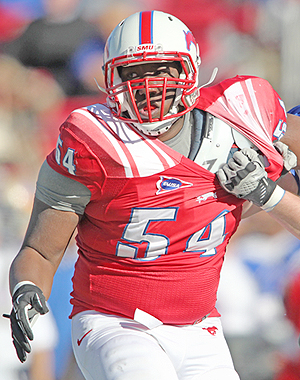Wright call?
Surprising penalty leaves unanswered questions
Posted on 11/12/2013 by PonyFans.com
Darrian Wright is not the complaining type. The junior SMU nose tackle from Dayton, Texas is generally a pretty quiet guy. He plays a thankless position on the field, taking on blockers so his teammates can make tackles. He doesn’t say much, often offering little more than a “yes, sir” to coaches, officials and media.
 |
| The Mustangs saw their chance to upset Cincinnati effectively end when nose tackle Darrian Wright was tagged with a penalty that rarely gets called ... especially late in close games (photo by SMU athletics). |
|
But Wright would have been justified if he had blown a valve Saturday in Cincinnati.
The Mustangs had closed the margin to three points, trailing the Bearcats, 28-25, and had just stopped the Cincinnati offense on third down at the SMU 11-yard line with 1:35 remaining. UC head coach Tommy Tuberville tried to ice the game by leaving his offense on the field for fourth down; if the Bearcats were able to gain the single yard needed for a first down, they would have first down with about 90 seconds remaining on the clock and the Mustangs out of timeouts. Considering the UC offense already had converted one of two fourth-down attempts and 10 of 16 on third down — many of which were quarterback draws on short yardage plays — Tuberville had to like his team’s chances.
Before the snap, both offensive linemen on the right side of the Bearcat line jumped. The line judge threw his flag and raced toward the center of the field, signaling a false start against Cincinnati. The penalty would have pushed the line of scrimmage back five yards, almost guaranteeing that Tuberville would have gone for a short field goal. No team wants to give up more points, but that scenario would have left the margin at six points. The Mustangs had no remaining timeouts, but quarterback Garrett Gilbert had thrown for 403 yards, so while a game-winning drive could not be called anything close to a sure thing, the Ponies still would have had a chance.
As referee Ed Ardito flipped on his microphone, a few of the Cincinnati players already were retreating … only to hear him announce a penalty against the Mustangs. Delay of game, Ardito said, adding that Wright had “mimicked” the Cincinnati offense’s signals at the line of scrimmage.
When an offense calls a quarterback sneak, as the Mustangs suspected the Bearcats would, the ball often is snapped on the first sound from the quarterback, so the defensive line will line up, look at the offensive line’s blocking scheme and then shift to try to fill any visible gaps through which an offensive player could run.
“I didn’t mimic anything,” Wright said after Tuesday’s practice. “When he made the call, I didn’t understand what he was calling.
“On that play, they only needed a yard, so we needed to be in the gaps. I was telling (defensive ends) Zach (Wood) and Beau (Barnes) to move. That’s it — I said, ‘Move! Move!’ That’s it.”
The rule specifically refers to mimicking the offensive signals as a “disconcerting signals” violation. Saturday’s game in Cincinnati was not the first in which the rule came into play. When the Mustangs played Sept. 21 at Texas A&M, SMU offensive tackle Kris Weeks got baited into five false start penalties because of Aggie defenders barking out SMU’s signals. In that game, several players said, the officials warned A&M defenders to stop or face the possibility of a flag. Officials are under no obligation to issue warnings, and Ardito and his staff offered none in Cincinnati.
“I’m not blaming them (for the final score),” Wright said of the officials. “They don’t have to warn anyone, I don’t think.”
That’s true, but the fact is that some officials do offer some warnings. How those are distributed varies from one official to another, and from one apparent violation to the next.
“It happens all the time,” center Taylor Lasecki said of the practice of a defense barking out signals to upset the offensive rhythm. “A&M was the worst. They came here last year and did it, and they did it at their place this year, where they got Kris (Weeks) on those false starts. But it happens all the time, (in) almost every game.
“They do give our warnings sometimes. If Chauncey (Briggs) or Kris (Weeks) is a little off the line of scrimmage, that’s an illegal formation, and sometimes (the official) will say, ’71, step up a little … 75, step up.’ So I’m not really sure when they can warn you, and when they can’t.”
Not surprisingly, SMU head coach June Jones steered clear of the topic, both after the game and after Saturday’s practice, as he and almost all coaches normally do. But Wright and Lasecki said they couldn’t remember that penalty being called, especially in the late stages of such a close game.
“You can’t say we would have won (if the call had not been made and the Mustangs had gotten the ball back trailing by either three or six points),” Wright said. “But the way our offense was moving the ball, I liked our chances. At least we would have had a chance.”







